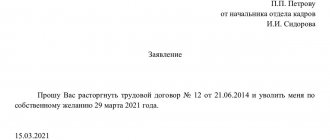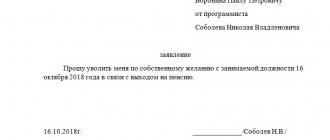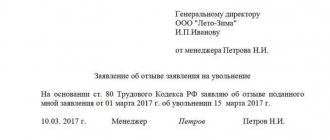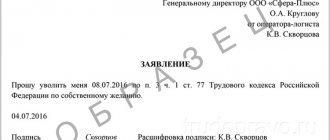Possible reasons
The most common reasons for voluntary dismissal are as follows:
- lack of opportunity to develop along the career ladder;
- low wages.
People always want to develop in their activities, not only in order to improve their professionalism, but also to receive higher wages.
Labor legislation identifies the following valid reasons for dismissal at will:
- Reaching retirement age. A person wishes to receive pension payments.
- Relocation of a family to another locality or to another state (for example, for work).
- Having an illness that limits a person's ability to continue working. An illness may force an employee to move to another city, town, or country.
- Having a sick relative who needs to be cared for. This also applies to a child or close relative with a disability. It is recommended to provide a certificate of such health status from a medical organization.
- The need to care for a child under fifteen years of age arises.
- Admission to an educational institution to obtain higher education. Enrollment in graduate school may also be the reason for dismissal.
- Commitment of violations by the management of the enterprise.
When a person argues for his dismissal with good reasons, he is recommended to attach documentary evidence of this fact.
Dismissal during pregnancy and maternity leave
If a woman has documented the onset of pregnancy, then from that moment on the employer does not have the right, by its decision, to dismiss such an employee. This requirement is fixed in Article 261 of the Labor Code.
In accordance with the law, a manager cannot fire a woman even in the following cases:
- committing a disciplinary offense;
- unsatisfactory performance results;
- absenteeism.
By decision of the employer, dismissal is possible if the company is liquidated. When a woman works under a contract signed with an individual entrepreneur, dismissal may occur if it is closed. A pregnant woman should be warned that the enterprise will be liquidated. This must be done two months before the start of the liquidation process in writing.
While pregnant, a woman has the right to express her desire to unilaterally terminate her employment relationship. In addition, the parties can reach such a solution mutually. It is formalized by agreement. The document is drawn up in two copies.
The agreement must include the following information:
- The amount of money to be paid.
- Date of termination of employment duties.
- Other information relevant in this case.
To resign on her own initiative, a woman needs to write an application and submit it to the manager or the appropriate specialist. When a woman quits after the decision has been made, she is not entitled to compensation. She receives a salary for the days that were actually worked. The legislation is aimed at protecting childhood and motherhood, therefore, in case of violation, administrative liability is applied to the employer.
A woman has the right to apply for dismissal while on maternity leave. It must be prepared two weeks before the date on which she wishes to terminate the employment relationship. This time is required to prepare documents, carry out calculations and make payments. Also these days the employer can find another specialist for this position.
The parties' relationship may end before the end of two weeks if they have reached an agreement. Dismissal can be formalized on the day the application is received. Often, the position of an employee on maternity leave is already occupied by another company employee or a new employee. The date of dismissal in such a situation is the day indicated in the employee’s application.
The management of the organization needs to make payments on this day, as well as issue all the necessary documents. If a woman needs additional documents, she must submit a written request. Documents can be sent by mail as agreed by the parties. This is due to the difficulties of moving with a small child.
How are grounds and causes classified?
To terminate an employment contract there must be at least one of the legal grounds, which can be classified as:
- basic;
- additional;
- due to current circumstances;
- legally justified.
1. In Art. 77 of the Labor Code of the Russian Federation provides a list of general grounds when an employment contract ceases to be valid:
- Based on the agreement and agreement reached between the owner and the hired worker (Article 78 of the Labor Code of the Russian Federation).
- Upon expiration of the contract or the scope of work provided for by its terms has been completed (Article 79 of the Labor Code of the Russian Federation).
- When an employee no longer wants, or due to current circumstances cannot continue to work in this organization and wants to resign of his own free will (Article 80 of the Labor Code of the Russian Federation).
- The employer does not want to continue to have any joint production relations with the employee in the future due to loss of trust or failure to fully fulfill official duties, violations of labor discipline, and other situations permissible in accordance with Art. 81 Labor Code of the Russian Federation.
- In the event that, under a written guarantee of employment from another employer, a person is transferred to another organization or may be elected to an elective position.
- If the employee is not satisfied with the new owner of the enterprise or changes in jurisdiction that occurred in connection with the reorganization, the transition of a state institution to a municipal type (Article 75 of the Labor Code of the Russian Federation).
- If the employee does not agree to accept the changes made by the employer to the terms of the employment contract and refuses to continue working, fulfilling the new requirements (Part 4 of Article 74 of the Labor Code of the Russian Federation).
- If the employee does not want to transfer to a vacant position offered by the manager, where the working conditions are compatible with his state of health and medical report.
This may include cases when the employer does not have suitable workplaces where the employee can continue to work if medical indications do not allow him to perform previous duties (transfer to light work, according to Part 3 and Part 4 of Article 73 of the Labor Code of the Russian Federation);
- Change by the owner of the legal and actual address of the location of the enterprise and the employee’s refusal to move from his main place of residence in order to be able to continue working in his specialty for the previous owner (Part 1 of Article 72.1 of the Labor Code of the Russian Federation);
- Circumstances that do not depend on the wishes of either party to the contractual relationship (Article 83 of the Labor Code of the Russian Federation);
- When the contract is concluded in violation of the rules established by labor legislation or other federal laws, which excludes the possibility of continuing to work further (Article 84 of the Labor Code of the Russian Federation).
2. Additional reasons when an employment contract may be terminated are also defined in the Labor Code of the Russian Federation, these include:
- removal from his position of the head of an enterprise that is in the process of bankruptcy (Article 278 of the Labor Code of the Russian Federation);
- termination of contractual relations providing for combination of professions when hiring a person for a combined position for permanent work;
- For teachers involved in the upbringing and education of the younger generation, the following is fraught with dismissal: repeated violation of the charter of an educational institution;
- even a single use of unacceptable methods of education with the use of violence against a student of a physical or psychological nature;
- reaching the age when, according to Art. 332 of the Labor Code of the Russian Federation, certain positions cannot be filled;
- in the event of an emergency in the host country (the outbreak of hostilities, natural disasters, etc.);
- in case of disqualification for more than six months;
This is also important to know:
Certificates upon dismissal of an employee in 2021: what certificates does the employee receive?
Special requirements for compliance with the charter or regulations on discipline for civil servants, accordingly, expand the grounds giving the right to terminate the employment relationship if they are not fulfilled.
3. The legal grounds for termination of an employment contract are listed in Art. 83 of the Labor Code of the Russian Federation, when the decision to dismiss does not depend on the will of the parties:
- conscription into the Army to fulfill military duty to the Motherland, or for alternative civilian service in special cases determined by law;
- when by a court decision the dismissal of a previously held position in whose place a new employee is hired is declared illegal and the latter is restored to his rights to work;
- if an employee is found guilty of a crime by a court verdict and sent to places of serving the actual sentence, or is excluded from the possibility of further engaging in certain types of activities;
- due to the deterioration of a person’s health, the conclusion of a medical examination indicating complete disability;
- unexpected death of an employee or employer, equivalent to this situation, a court decision declaring an individual dead or missing;
- recognition by the Government of the country or a government body of a constituent entity of the Russian Federation of the onset of emergency situations when it is impossible to continue normal work activity (natural and man-made disasters, accidents, epidemics of viral diseases, the outbreak of hostilities, etc.);
- bringing to administrative responsibility up to and including disqualification of the employee and issuing a decision to remove him from his position for a specified period;
- in case of expiration of a possible two-month period of suspension of special licenses, if it is no longer possible for the employee to perform his job duties (for example, deprivation of a driver’s license, the right to store and carry weapons, etc.);
- in case of a ban on access to state secrets, when fulfillment of the terms of the employment contract is impossible without this permission;
- if a previously adopted court decision on reinstatement at work is canceled upon appeal by the employer;
- in other cases, when circumstances arise that, in accordance with the requirements of labor legislation and federal laws, exclude certain departments and sectors of the national economy from engaging in a certain type of activity.
4. From a legal point of view, termination of an employment contract is regulated by law and must be carried out in compliance with the established rules:
- the validity of the decision to dismiss the employee;
- fulfillment of all procedural requirements;
- documentary evidence of the legal basis for termination of industrial relations.
Dismissal of military personnel
The legislation regulates the relations of the parties during military service and provides for voluntary dismissal. To do this, a person must provide a compelling written argument.
We recommend you study! Follow the link:
Step-by-step instructions on how to quit your job voluntarily
These reasons include:
- Residence of close family members outside of Russia.
- Lack of funds to provide for the family.
- The need to support or raise a minor child.
- Pregnancy.
- The death of a loved one, after which the person cannot serve.
The serviceman needs to prepare a report indicating good reasons. The commander accepts it and makes his decision. The report may be sent to the appropriate commission. After this, it is decided when the dismissal occurs. A person can be fired within seven or fifteen days, but the whole process can be delayed by documents that will take a long time to travel from Moscow to the relevant unit.
Without working off
An employee of an enterprise has the right to resign at any time that is convenient for him. He can do this:
- on holiday;
- while performing their professional duties;
- on probation;
- after an interview or resume review;
- on a sick leave.
The law requires an employee to notify management of his intentions to resign in advance. This period is fourteen days. The law allows you not to work after dismissal.
To do this, the parties must reach an agreement. Management allows dismissal without working the required number of days if the employee can provide documented evidence of urgent need or good cause.
Application for resignation
The law does not determine the exact form of the application for dismissal.
In this case, you need to adhere to certain rules. The application must be written independently. It can be written by hand or using computer technology. The application must be written addressed to the head of the enterprise. It is not written in the name of the head of the unit.
In the right corner you need to indicate the following:
- personal information about the boss;
- name of company;
- personal information about the employee and his position;
- date of termination of relations between the parties;
- a description of the reasons for the desire to quit;
- expression of desire to use vacation;
- date of application, signature.
The prepared document must be submitted to the personnel department. This can also be done to the head of the organization. It is recommended to prepare the application in two versions. On the second one you need to put a mark with the number from the incoming correspondence log.
When the manager refuses to accept the document, it should be sent by mail. The letter must be sent by registered mail, so that notification will be returned upon receipt. After 14 days, the employee has the right not to go to his workplace. The application must be written and submitted on the same day.
When terminating an employment contract at the employee’s initiative, the application must indicate the number of the document being terminated. When dismissal occurs by consent on the next day, this should be documented in an agreement. The agreement must necessarily contain the following information:
- The date on which the employment relationship ends.
- Last working day.
- List of payments to be paid.
Payments are indicated if they were discussed in the employment agreement of the parties.
What laws govern the legal relationship between employer and employee?
The relationship between an employee and his employer is regulated by labor law.
Its main source is the Labor Code of the Russian Federation of December 30, 2001, 197-FZ, regulations.
This is also important to know:
How to fire an employee without his desire: what the law says
On their basis, an employment contract is developed between the employer and the employee.
According to Art. 6 of the Labor Code, the procedure for dismissal is established by federal authorities.
The general grounds for dismissal are given in Art. 77 TK.
Also, the document (Articles 278, 288, 307, 312, 336) provides additional grounds on which an employee can be dismissed.
Dismissal occurs:
- at the initiative of an employee or employer;
- by agreement of the parties;
- due to circumstances (not at the will of the employer and employee);
- when does a fixed-term employment contract end?
- if the employee is to be transferred to another employer or to another position (job);
- if the employee does not agree to work due to a change in the owner of the organization;
- if the employee refused to work due to a critical change in the terms of the employment contract;
- when an employee refuses to be transferred when the employer moves to another location;
- when an employee refuses to be transferred to another job due to changes in his health status;
- when the rules for concluding an employment contract are violated, if this makes it impossible to continue working.
The first five types of dismissal are the most common.
Order of dismissal
Until 2013, management had to issue a dismissal order in a form established by regulations.
At the moment, an enterprise can independently determine the form of the document. At the same time, it must necessarily contain a clause that contains the grounds for dismissal. An organization can establish a sample order that meets the requirements of Article 9 of Federal Law No. 402.
It should include the following points:
- Title of the document;
- name of the enterprise;
- main text;
- employee information;
- signature of the head of the organization;
- signature of the employee who is resigning.
The employee must be familiar with the order. After that, he signs it. In addition to the signature of the manager, the order contains the seal of the organization or individual entrepreneur.
Reasons for dismissing an employee that do not require prior sanctions
Clauses 5 and 6 of Art. 81 of the Labor Code of the Russian Federation provide for the possibility of dismissing an employee if labor discipline is not observed. The difference between them is that dismissal under clause 5 is possible only if the employee already has an outstanding disciplinary sanction, and clause 6 does not require an existing punishment, but states that the offense must be gross.
The same article of the Labor Code of the Russian Federation provides a list of gross violations of labor discipline, which make it possible to dismiss a person who has not previously had any penalties. Moreover, according to paragraph 38 of the resolution of the Plenum of the Armed Forces of the Russian Federation dated March 17, 2004 No. 2, the presented list of violations is not subject to a broad interpretation and is exhaustive.
Reasons for dismissing an employee that do not require prior sanctions are as follows:
- absenteeism, which means absence from work for more than 4 hours;
- being at work in a state of intoxication;
- disclosure of commercial, official or other protected secrets;
- entry into force of a judicial act confirming the theft of property, embezzlement, or damage to property at work;
- non-compliance with labor safety requirements, resulting in serious consequences.
It turns out that all other violations of labor discipline cannot be grounds for dismissal if the employee has no outstanding penalties. Read about this in the article “How long does a disciplinary sanction last?”
Calculation of severance
On the day of dismissal, the employee is required to pay the amounts due to him from the organization (Article 116 of the Labor Code).
When an employee is not at work on his last working day, these funds must be paid the next day after the employee receives a request to make a payment. The employee is recommended to indicate in his resignation letter the date when he wishes to receive a payment. When a dispute arises between an employee and the company's management regarding the amount of money, until resolution, the company is obliged to pay the amount in respect of which there is no disagreement.
We recommend you study! Follow the link:
Features of dismissal under Article 78 of the Labor Code of the Russian Federation
For example, a company has claims against an employee because he caused damage through his actions. However, the employee himself does not think so. The organization must pay the money, and only then go to court with a demand to recover it from the former employee.
Deductions must be transferred in accordance with the provisions of Article 128 of the Labor Code of the Russian Federation.
The law does not apply deduction to the following payments:
- severance pay;
- compensation.
The employee is entitled to a benefit payment in the amount of three salaries if the manager decides to terminate the employment relationship with the employee through layoffs.
Reasons why an employee may terminate an employment relationship:
- The administration of the enterprise violates labor legislation.
- Violations of the terms of the agreement (collective, labor) occur.
As stated above, no deduction is made from such benefits. When funds are not paid on time, the employer is obliged to make payments on the day the documents and other compensation are issued. If, by a court decision in favor of the employee, the company is obliged to make compensation for the period of time when there were delays. When making a decision in favor of the organization, the court determines the amount of compensation.
Why you can fire an employee under the Labor Code
The grounds for dismissal of an employee under the Labor Code of the Russian Federation, initiated by the employer, are listed in Art. 81 of this normative act. At the same time, the list given in it is not exhaustive (special norms of the Labor Code of the Russian Federation or special laws may provide for other grounds).
This is also important to know:
How is dismissal under an article for drunkenness carried out: the procedure
Unlike the right of an employee, who can quit without giving any reason, the right of an employer to dismiss an employee is limited by law. The restriction is aimed at protecting the employee as the more vulnerable person in the relationship in question.
The grounds listed in this article, in turn, are also classified into 2 types:
- Grounds arising as a result of the employee committing illegal actions or other guilty behavior.
- Grounds that have an objective reason, in the absence of a relationship with the employee’s guilty behavior.
The grounds related to the first type are listed by the legislator in paragraphs. 5–11 st. 81 of the Labor Code of the Russian Federation, among them:
- failure to fulfill duties in the absence of valid reasons, committed more than once;
- gross failure to comply with duties committed once;
- actions of the employee that caused a loss of confidence in him;
- committing an immoral act (for certain categories of workers);
- actions that caused damage to the employer (in relation to managers, their deputies and chief accountants);
- submission of false documents during the registration of labor relations.
All other grounds on which you can dismiss an employee, named in this article, belong to the second type.
Compensation for unused vacation
Legislative norms in the field of labor relations provide for compensation if the employee does not use the required vacation days each year.
The employer must also compensate additional vacation days for employees with special status:
- presence of a child under 1.5 years old;
- presence of a minor or adult child with a disability.
This provision is enshrined by the legislator.
The following categories of employees, provided they have worked at the enterprise for at least ten months, should receive compensation for days not spent on vacation for the full duration:
- Leaders.
- School and university specialists.
- Scientific workers.
- Teachers.
- Scientific and pedagogical workers.
If an employee expresses a desire to use vacation and then resign, he has every right to do so.
The last day of vacation will also be the day the employee is dismissed. The employee must indicate in the application his desire to receive compensation for vacation that was not used or to take off his allotted vacation.









